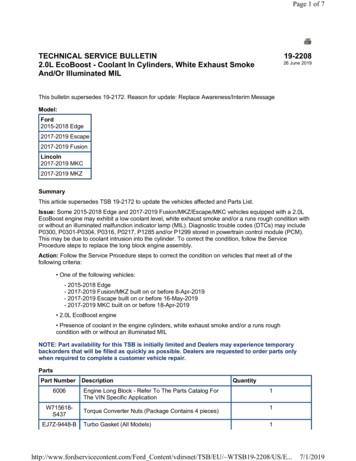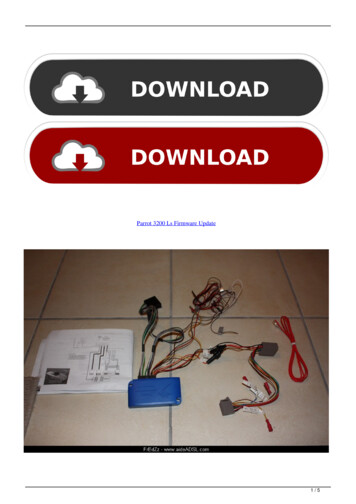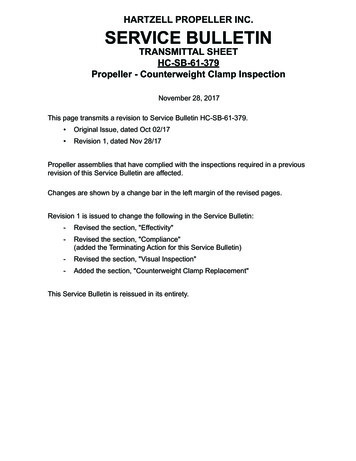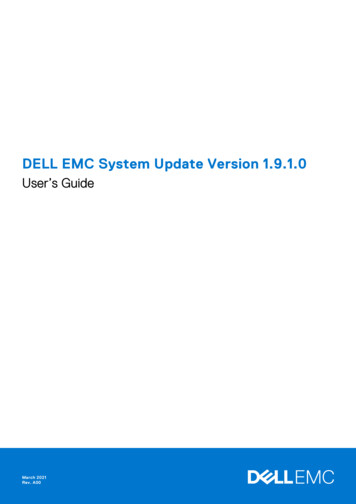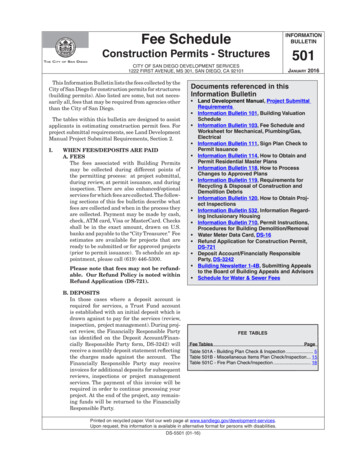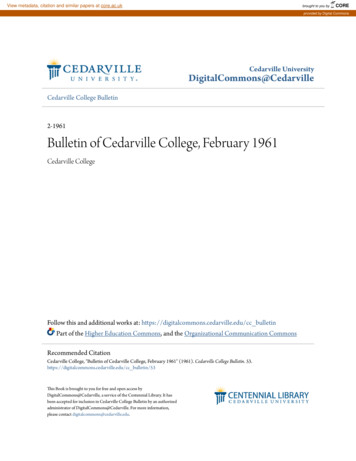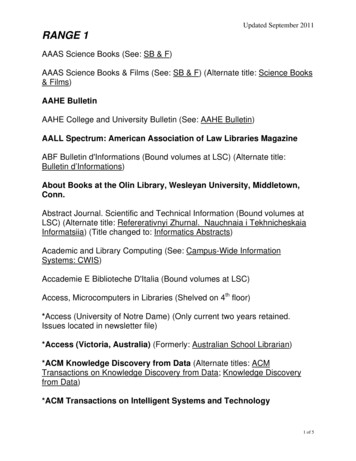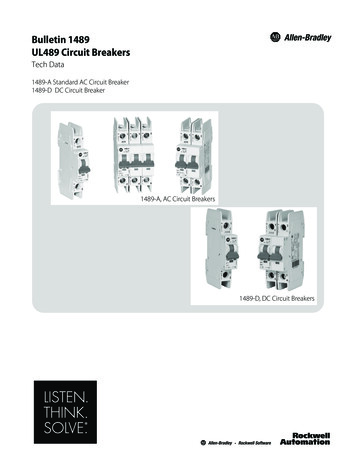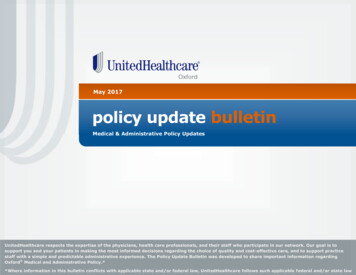
Transcription
May 2017policy update bulletinMedical & Administrative Policy UpdatesUnitedHealthcare respects the expertise of the physicians, health care professionals, and their staff who participate in our network. Our goal is tosupport you and your patients in making the most informed decisions regarding the choice of quality and cost-effective care, and to support practicestaff with a simple and predictable administrative experience. The Policy Update Bulletin was developed to share important information regardingOxford Medical and Administrative Policy.**Where information in this bulletin conflicts with applicable state and/or federal law, UnitedHealthcare follows such applicable federal and/or state law
OxfordOxford Medical and Administrative Policy UpdatesOverviewThis bulletin provides complete details on Oxford Clinical,Administrative and Reimbursement Policy updates. The inclusion ofa health service (e.g., test, drug, device or procedure) in thisbulletin indicates only that UnitedHealthcare has recently adopted anew policy and/or updated, revised, replaced or retired an existingpolicy; it does not imply that Oxford provides coverage for thehealth service. In the event of an inconsistency or conflict betweenthe information provided in this bulletin and the posted policy, theprovisions of the posted policy will prevail. Note that most benefitplan documents exclude from benefit coverage health servicesidentified as investigational or unproven/not medically necessary.Physicians and other health care professionals may not seek orcollect payment from a member for services not covered by theapplicable benefit plan unless first obtaining the member’s writtenconsent, acknowledging that the service is not covered by thebenefit plan and that they will be billed directly for the service.A complete library of Oxford Medical andAdministrative Policies is available atOxfordHealth.com Providers Tools & Resources Medical Information Medical and Administrative Policies.Tips for using the Policy Update Bulletin:2 From the table of contents, click the policy title to bedirected to the corresponding policy update summary. From the policy updates table, click the policy title to view acomplete copy of a new, updated, or revised policy.Oxford Policy Update Bulletin: May 2017Policy Update ClassificationsNewNew clinical coverage criteria and/or documentation reviewrequirements have been adopted for a service, procedure, test, ordeviceUpdatedAn existing policy has been reviewed and changes have not been madeto the clinical coverage criteria or documentation review requirements;however, items such as the clinical evidence, FDA information, and/orlist(s) of applicable codes may have been updatedRevisedAn existing policy has been reviewed and revisions have been made tothe clinical coverage criteria and/or documentation review requirementsReplacedAn existing policy has been replaced with a new or different policyRetiredThe procedural codes and/or services previously outlined in the policyare no longer being managed or are considered to be proven/medicallynecessary and are therefore not excluded as unproven/not medicallynecessary services, unless coverage guidelines or criteria are otherwisedocumented in another policyNote: The absence of a policy does not automatically indicate or implycoverage. As always, coverage for a service or procedure must bedetermined in accordance with the member’s benefit plan and anyapplicable federal or state regulatory requirements. Additionally,UnitedHealthcare reserves the right to review the clinical evidencesupporting the safety and effectiveness of a medical technology prior torendering a coverage determination.
OxfordOxford Medical and Administrative Policy UpdatesIn This IssueClinical Policy UpdatesPageUPDATED Actemra (Tocilizumab) Injection for Intravenous Infusion - Effective May 1, 2017 . 6Chelation Therapy for Non-Overload Conditions - Effective May 1, 2017 . 7Embolization of the Ovarian and Iliac Veins for Pelvic Congestion Syndrome - Effective May 1, 2017. 8Fecal DNA Testing - Effective May 1, 2017 . 8Gene Expression Tests - Effective May 1, 2017 . 9Injectable Chemotherapy Drugs: Application of NCCN Clinical Practice Guidelines - Effective Jun. 1, 2017 . 10Orencia (Abatacept) Injection for Intravenous Infusion - Effective May 1, 2017 . 13Simponi Aria (Golimumab) Injection for Intravenous Infusion - Effective Jun. 1, 2017 . 14Stelara (Ustekinumab) - Effective Jun. 1, 2017. 15Thermography - Effective May 1, 2017 . 18REVISED 3Ablative Treatment for Spinal Pain - Effective Jun. 1, 2017 . 18Bariatric Surgery - Effective Jun. 1, 2017 . 20Blepharoplasty, Blepharoptosis and Brow Ptosis Repair - Effective Jun. 1, 2017 . 23Chromosome Microarray Testing - Effective Jun. 1, 2017 . 29Cochlear Implants - Effective Jun. 1, 2017 . 30Drug Coverage Criteria - New and Therapeutic Equivalent Medications - Effective Jun. 1, 2017 . 32Drug Coverage Guidelines - Effective May 1, 2017 . 33o Brilinta (Ticagrelor) . 33Drug Coverage Guidelines - Effective May 15, 2017 . 33o Atorvastatin (Generic Lipitor) 10mg, 20mg. 33o Simvastatin (Generic Zocor) 5mg, 10mg, 20mg, 40mg . 33Drug Coverage Guidelines - Effective Jun. 1, 2017 . 33o Actemra (Tocilizumab): SQ Injection . 33o Adzenys XR (Amphetamine Extended-Release) . 33o Albenza (Albendazole) . 33o Alecensa (Alectinib). 33o Austedo (Deutetrabenazine) . 33o Belsomra (Suvorexant) . 33o Cimzia (Certolizumab Pegol). 34o Cosentyx (Secukinumab) . 34o Emverm (Mebendazole) . 34o Enbrel (Etanercept) . 34Oxford Policy Update Bulletin: May 2017
OxfordOxford Medical and Administrative Policy UpdatesIn This Issue 4oooooooooooooooooooooooooooEucrisa (Crisaborole) . 34Farydak (Panobinostat) . 34Ibrance (Palbociclib) . 34Imbruvica (Ibrutinib) . 34Kineret (Anakinra) . 34Korlym (Mifepristone) . 34Mekinist (Trametinib) . 34Methylphenidate Extended-Release Capsule (Generic Metadate CD) . 34Ninlaro (Ixazomib) . 34Nucynta ER (Tapentadol Extended Release) . 34Obredon Solution (Hydrocodone/Guaifenesin). 35Opana ER (Oxymorphone Extended Release) . 35Orencia (Abatacept) . 35Oxycontin (Oxycodone Extended Release) . 35Oxycodone ER 12HR Tablet . 35Oxymorphone Extended Release . 35Rescula (Unoprostone) . 35Rozerem (Ramelteon) . 35Simponi (Golimumab). 35Tafinlar (Dabrafenib) . 35Travoprost (Generic Travatan) . 35Vermox (Mebendazole) . 35Viberzi (Eluxadoline) . 35Xtampza ER (Oxycodone) . 35Zelboraf (Vemurafenib) . 35Zioptan (Tafluprost) . 36Zolpimist (Zolpidem Tartrate) . 36Genetic Testing - Effective May 1, 2017 . 36Lemtrada (Alemtuzumab) - Effective Jun. 1, 2017 . 36Neurophysiologic Testing - Effective Jun. 1, 2017 . 38Omnibus Codes - Effective Jun. 1, 2017 . 40Otoacoustic Emissions Testing - Effective May 1, 2017 . 41Preventive Care Services - Effective Jun. 1, 2017 . 42Site of Service Guidelines for Certain Outpatient Surgical Procedures - Effective Jul. 1, 2017 . 48Specialty Medication Administration - Site of Care Review Guidelines - Effective Jun. 1, 2017 . 51Spinraza (Nusinersen) - Effective May 1, 2017 . 52Oxford Policy Update Bulletin: May 2017
OxfordOxford Medical and Administrative Policy UpdatesIn This IssueAdministrative Policy UpdatesUPDATED Behavioral Health Services - Effective Jun. 1, 2017 . 57Durable Medical Equipment, Orthotics, Ostomy Supplies, Medical Supplies and Repairs/Replacements - Effective May 1, 2017 . 58New York Participating Provider Laboratory & Pathology Protocol - Effective May 1, 2017 . 59Par Gastroenterologists Using Non-Par Anesthesiologists: In-Office & Ambulatory Surgery Centers - Effective May 1, 2017 . 62Timeframe Standards for Utilization Management (UM) Initial Decisions - Effective May 1, 2017. 64REVISED Precertification Exemptions for Outpatient Services - Effective Jun. 1, 2017 . 66Reimbursement Policy UpdatesUPDATED Ambulance - Effective May 1, 2017 . 68Global Days - Effective May 1, 2017 . 70Multiple Imaging Rules - Effective May 1, 2017 . 70Multiple Procedures - Effective May 1, 2017 . 70Procedure and Place of Service - Effective May 1, 2017 . 71Services and Modifiers Not Reimbursable to Healthcare Professionals - Effective May 1, 2017 . 71Telemedicine - Effective May 1, 2017 . 73REVISED 5Assistant Surgeon - Effective May 15, 2017 . 76B Bundle Codes - Effective Jun. 1, 2017 . 79Bilateral Procedures - Effective May 15, 2017 . 79Maximum Frequency Per Day - Effective May 15, 2017. 83Physical Medicine & Rehabilitation: Multiple Therapy Procedure Reduction - Effective May 1, 2017 . 88Replacement Codes - Effective Jun. 1, 2017 . 88Supply Policy - Effective May 15, 2017 . 90Time Span Codes - Effective May 15, 2017 . 92Oxford Policy Update Bulletin: May 2017
OxfordClinical Policy UpdatesPolicy TitleEffective DateSummary of ChangesCoverage RationaleMay 1, 2017 Please refer to Injectable Chemotherapy Drugs: Application of NCCN ClinicalPractice Guidelines for updated information based upon the NationalComprehensive Cancer Network (NCCN) Drugs & Biologics Compendium (NCCN Compendium ) for oncology indications.UPDATEDActemra (Tocilizumab)Injection forIntravenousInfusion6Updated supporting informationto reflect the most currentdescription of services, clinicalevidence, FDA information, andreferenceso Replaced reference to“Milliman Care Guidelines ,Ambulatory Care, 19thedition” with “MCG CareGuidelines, Ambulatory Care,21st edition”Oxford Policy Update Bulletin: May 2017This policy refers to Actemra (tocilizumab) injection for intravenous infusion.Actemra is proven and medically necessary for the treatment of: Polyarticular juvenile idiopathic arthritis when all of the followingcriteria are met:o Diagnosis of polyarticular juvenile idiopathic arthritis (PJIA); ando Actemra is initiated and titrated according to US Food and DrugAdministration labeled dosing for polyarticular juvenile idiopathicarthritis up to a maximum of (or equivalent dose and intervalschedule): 10mg/kg every 4 weeks for patients weighing 30kg 8mg/kg every 4 weeks for patients weighing 30kg;ando Patient is not receiving Actemra in combination with either of thefollowing: Biologic disease-modifying antirheumatic drug (DMARD) [e.g.,Enbrel (etanercept), Humira (adalimumab), Cimzia(certolizumab), Simponi (golimumab)] Janus kinase inhibitor [e.g., Xeljanz (tofacitinib)] Rheumatoid arthritis when all of the following criteria are met:o Diagnosis of moderate to severely active rheumatoid arthritis (RA);ando History of failure, contraindication, or intolerance to at least onenon-biologic DMARD [e.g., methotrexate, leflunomide, sulfasalazine,hydroxychloroquine, minocycline, etc.]; ando Actemra is initiated and titrated according to US Food and DrugAdministration labeled dosing for rheumatoid arthritis up to amaximum of 800mg every 4 weeks (or equivalent dose and intervalschedule); ando Patient is not receiving Actemra in combination with either of thefollowing: Biologic DMARD [e.g., Enbrel (etanercept), Humira(adalimumab), Cimzia (certolizumab), Simponi (golimumab)] Janus kinase inhibitor [e.g., Xeljanz (tofacitinib)]
OxfordClinical Policy UpdatesPolicy TitleEffective DateSummary of ChangesCoverage RationaleUPDATEDActemra (Tocilizumab)Injection forIntravenousInfusion(continued)May 1, 2017Chelation Therapyfor Non-OverloadConditionsMay 1, 2017 Updated supporting informationto reflect the most currentclinical evidence, FDAinformation, and references; nochange to coverage rationale orlist of applicable codesSystemic juvenile idiopathic arthritis when all of the followingcriteria are met:o Diagnosis of systemic juvenile idiopathic arthritis (SJIA); ando Actemra is initiated and titrated according to US Food and DrugAdministration labeled dosing for systemic juvenile idiopathic arthritisup to a maximum of (or equivalent dose and interval schedule): 12mg/kg every 2 weeks for patients weighing 30kg 8mg/kg every 2 weeks for patients weighing 30kg;ando Patient is not receiving Actemra in combination with either of thefollowing: Biologic DMARD [e.g., Enbrel (etanercept), Humira(adalimumab), Cimzia (certolizumab), Simponi (golimumab)] Janus kinase inhibitor [e.g., Xeljanz (tofacitinib)]Chelation for heavy metal toxicity and overload conditions (e.g., iron,copper, lead, aluminum) is proven and medically necessary and notaddressed in this policy.Chelation therapy is unproven and not medically necessary for thetreatment of "mercury toxicity" from dental amalgam fillings.Randomized controlled trials do not identify a causal association betweenamalgam fillings and various systemic symptoms and disorders attributed tomercury.Chelation therapy is unproven and not medically necessary for thetreatment of chronic, progressive diseases (not involving heavymetal toxicity or overload conditions) and other disorders includingbut not limited to: Alzheimer's disease Apoplectic coma Autism spectrum disorder Cancer Cardiovascular disease Cholelithiasis Chronic fatigue syndrome Chronic renal insufficiency Defective hearing Diabetes Diabetic ulcer7Oxford Policy Update Bulletin: May 2017
OxfordClinical Policy UpdatesPolicy TitleEffective DateSummary of ChangesCoverage RationaleUPDATEDChelation Therapyfor Non-OverloadConditions(continued)May 1, 2017 GoutErectile dysfunctionMultiple sclerosisOsteoarthritisOsteoporosisParkinson's diseaseRaynaud's diseaseRenal calculusRheumatoid arthritisSchizophreniaSclerodermaSnake venom poisoningVaricose veinsVision disorders (glaucoma, cataracts, etc.)Much of the evidence supporting chelation treatment for other chronicprogressive disease is based on testimonials and single-case studies. Thus,there still is no scientific evidence that demonstrates any benefit from thisform of therapy.Embolization of theOvarian and IliacVeins for PelvicCongestionSyndromeMay 1, 2017 Updated supporting informationto reflect the most currentclinical evidence and references;no change to coverage rationaleor lists of applicable codesEmbolization of the ovarian or internal iliac veins is consideredunproven and not medically necessary for treating pelvic congestionsyndrome.The body of evidence in the peer-reviewed medical literature regardingembolization of the ovarian or internal iliac veins for the treatment of pelviccongestion syndrome is insufficient and poor quality. Additional welldesigned randomized controlled trials are necessary to establish the relativesafety and efficacy of the embolization procedure as a treatment of pelviccongestion syndrome.Fecal DNA TestingMay 1, 2017 Updated supporting informationto reflect the most currentclinical evidence and references;no change to coverage rationaleor list of applicable codesFecal DNA testing for colorectal cancer screening and/or monitoringis unproven and not medically necessary.There is insufficient published evidence in the clinical literature supportingthe diagnostic accuracy of fecal DNA tests to screen for colorectal cancer inasymptomatic, average-risk patients. The gold standard for colorectal cancerscreening is optical colonoscopy. There is insufficient published evidencecomparing fecal DNA testing to optical colonoscopy. In fact, there isinsufficient published clinical evidence that fecal DNA testing reduces thelikelihood of mortality from colorectal cancer.Refer to the policy titled Experimental/Investigational Treatment.8Oxford Policy Update Bulletin: May 2017
OxfordClinical Policy UpdatesPolicy TitleEffective DateSummary of ChangesCoverage RationaleMay 1, 2017 Oncology IndicationsThyroid CancerMulti-panel gene expression tests (e.g., Afirma ) are proven andmedically necessary for assessing thyroid nodules that are notclearly benign or malignant based on fine-needle aspiration biopsyresults alone.UPDATEDGene ExpressionTestsUpdated list of applicable CPTcodes; added 0005UGene expression tests are unproven and not medically necessary forthe following indications:Cancer of Unknown Primary Identifying tissue of origin in difficult to diagnose cancers (e.g.,ResponseDX Tissue of Origin or CancerTYPE ID )Colon Cancer Predicting the likelihood of colon cancer recurrence (e.g., Oncotype DX Colon Cancer Assay)Multiple Myeloma Guiding therapy in patients with multiple myeloma (e.g., MyPRS )Prostate Cancer Predicting tumor aggressiveness and guiding disease management inpatients with newly diagnosed prostate cancer (e.g., Oncotype DX Prostate Cancer Assay and Prolaris ) Predicting risk of recurrence and metastasis and guiding diseasemanagement following radical prostatectomy (e.g., Decipher ProstateCancer Classifier)Uveal Melanoma Predicting metastatic risk of uveal melanoma (e.g., DecisionDx-UM)There is insufficient evidence in the clinical literature demonstrating thatthese tests have a role in clinical decision-making or have a beneficial effecton health outcomes. Further studies are needed to determine the clinicalutility of these tests.Non-Oncology Indications9Oxford Policy Update Bulletin: May 2017
OxfordClinical Policy UpdatesPolicy TitleEffective DateSummary of ChangesCoverage RationaleUPDATED10Gene ExpressionTests(continued)May 1, 2017InjectableChemotherapyDrugs: Applicationof NCCN ClinicalPractice GuidelinesJun. 1, 2017Coronary Artery DiseaseGene expression tests are unproven and not medically neces
Rheumatoid arthritis when all of the following criteria are met: o Diagnosis of moderate to severely active rheumatoid arthritis (RA); and o History of failure, contraindication, or intolerance to at least one non-biologic DMARD [e.g., methotrexate, leflunomide, sulfasalazine, hydroxychloroquine, minocycline, etc.];and
